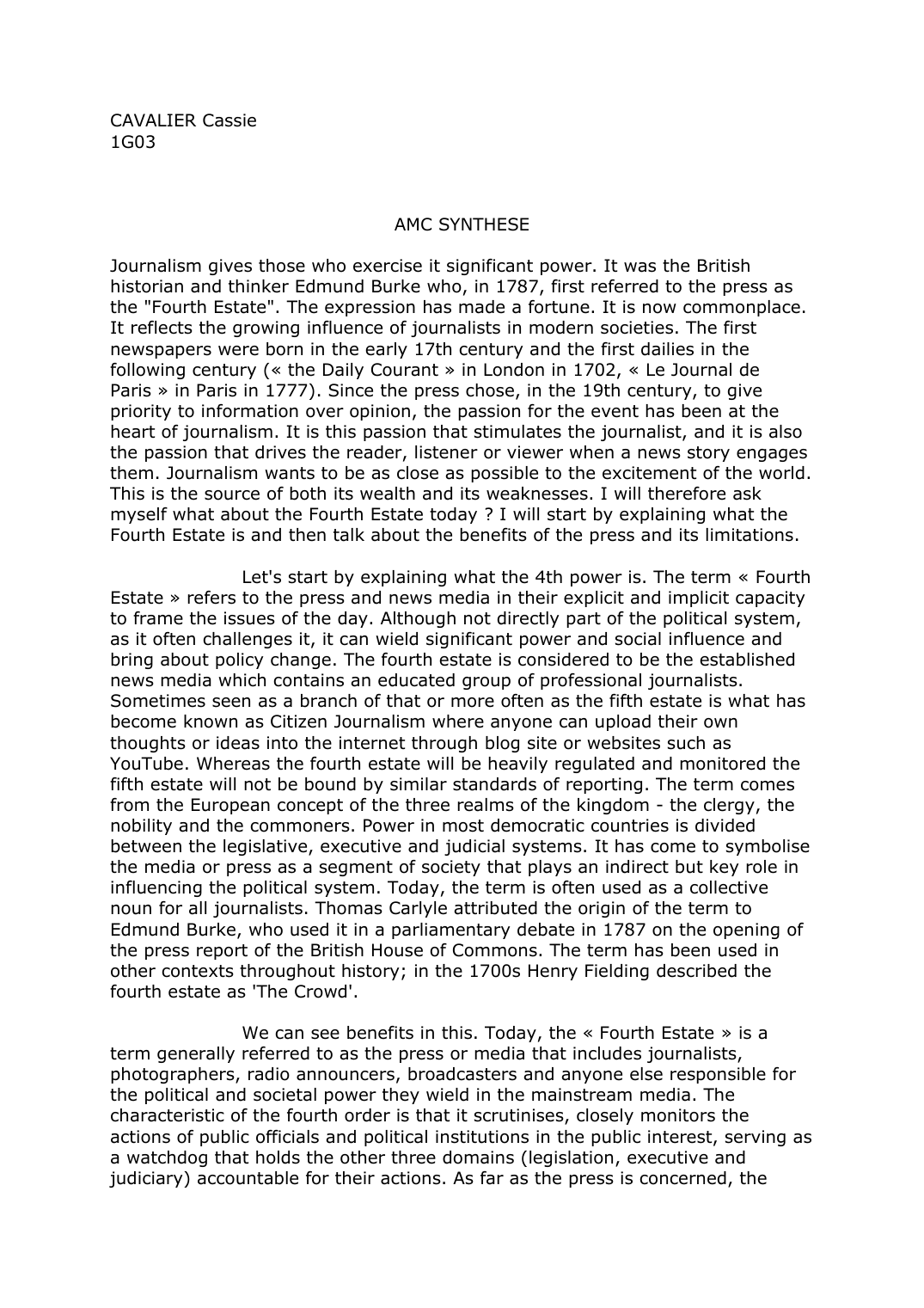AMC SYNTHESE
Publié le 27/03/2022
Extrait du document
«
AMC SYNTHESE
Journalism gives those who exercise it significant power.
It was the British
historian and thinker Edmund Burke who, in 1787, first referred to the press as
the "Fourth Estate".
The expression has made a fortune.
It is now commonplace.
It reflects the growing influence of journalists in modern societies.
The first
newspapers were born in the early 17th century and the first dailies in the
following century (« the Daily Courant » in London in 1702, « Le Journal de
Paris » in Paris in 1777).
Since the press chose, in the 19th century, to give
priority to information over opinion, the passion for the event has been at the
heart of journalism.
It is this passion that stimulates the journalist, and it is also
the passion that drives the reader, listener or viewer when a news story engages
them.
Journalism wants to be as close as possible to the excitement of the world.
This is the source of both its wealth and its weaknesses.
I will therefore ask
myself what about the Fourth Estate today ? I will start by explaining what the
Fourth Estate is and then talk about the benefits of the press and its limitations.
Let's start by explaining what the 4th power is.
The term « Fourth
Estate » refers to the press and news media in their explicit and implicit capacity
to frame the issues of the day.
Although not directly part of the political system,
as it often challenges it, it can wield significant power and social influence and
bring about policy change.
The fourth estate is considered to be the established
news media which contains an educated group of professional journalists.
Sometimes seen as a branch of that or more often as the fifth estate is what has
become known as Citizen Journalism where anyone can upload their own
thoughts or ideas into the internet through blog site or websites such as
YouTube.
Whereas the fourth estate will be heavily regulated and monitored the
fifth estate will not be bound by similar standards of reporting.
The term comes
from the European concept of the three realms of the kingdom - the clergy, the
nobility and the commoners.
Power in most democratic countries is divided
between the legislative, executive and judicial systems.
It has come to symbolise
the media or press as a segment of society that plays an indirect but key role in
influencing the political system.
Today, the term is often used as a collective
noun for all journalists.
Thomas Carlyle attributed the origin of the term to
Edmund Burke, who used it in a parliamentary debate in 1787 on the opening of
the press report of the British House of Commons.
The term has been used in
other contexts throughout history; in the 1700s Henry Fielding described the
fourth estate as 'The Crowd'.
We can see benefits in this.
Today, the « Fourth Estate » is a
term generally referred to as the press or media that includes journalists,
photographers, radio announcers, broadcasters and anyone else responsible for
the political and societal power they wield in the mainstream media.
The
characteristic of the fourth order is that it scrutinises, closely monitors the
actions of public officials and political institutions in the public interest, serving as
a watchdog that holds the other three domains (legislation, executive and
judiciary) accountable for their actions.
As far as the press is concerned, the.
»
↓↓↓ APERÇU DU DOCUMENT ↓↓↓
Liens utiles
- Exemple d’une fiche de révision : FICHE SYNTHESE SUR L’INTRODUCTION Les définitions Les textes ?
- SYNTHESE PLACES AND FORMS OF POWER
- SYNTHESE FABLES DE LA FONTAINE - LIVRES VII-XII
- SYNTHESE ECRITE Groupe 2 TPE Lors de leur année de première, les élèves sont amenés à effectuer des Travaux Personnels Encadrés (TPE).
- Fiche de Synthese: Rhinocéros, Ionesco






